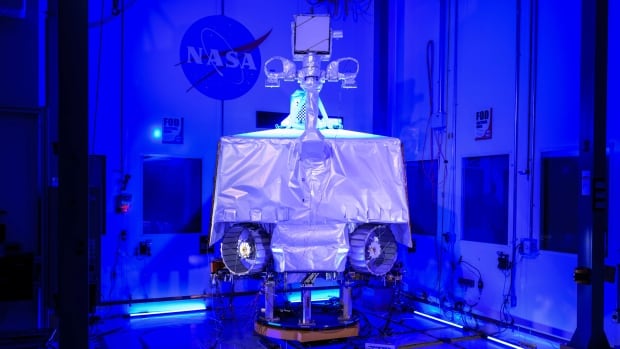NASA said Wednesday it’s cancelling its water-seeking moon rover, the Volatiles Investigating Polar Exploration Rover, or VIPER, citing cost overruns and launch delays.
“We have some news that NASA intends to discontinue the VIPER mission,” Nicky Fox, associate administrator of NASA’s science mission directorate, said in a media teleconference on Wednesday afternoon. “Decisions of course like this are never easy, and we’ve not made this one in any way lightly. But in this case the projected remaining expenses for VIPER would have resulted in having to either cancel or disrupt many other missions in our commercial lunar payload service line.”
The VIPER rover was supposed to launch in late 2023 aboard a lander provided by Astrobotic Technology, but extra testing and increased costs kept delaying the mission, threatening other projects, the space agency said.
The rover had aimed to explore the moon’s south pole, ahead of humans’ return to the lunar surface as part of the global NASA-led Artemis program. About $450 US million had been spent so far on its development.
The cancellation will save the agency $84 million, according to NASA.
Fox said that it was in no way a reflection of Astrobotic, but that it was more about a “very constrained budget environment.”
The space agency is planning to disassemble the already-built rover and reuse its instruments and other components for future lunar missions. However, it did note that, first, it will consider expressions of interest from U.S. industry and other international partners by Aug. 1 so long as there is no cost to the government.
Several scientists took to social media to express their concern over the cancellation.
This is a major blow for for Lunar science and exploration efforts. A sad loss for all those involved in the VIPER mission. <a href=”https://t.co/8sqYdkV13i”>https://t.co/8sqYdkV13i</a>
—@Dr_Hannah_Sarge
This is just another bump in NASA’s science operations.
In April, the space agency paused the Mars Sample Return mission that was to return samples to Earth collected by the Perseverance rover on the Martian surface. Instead, they are asking private industry and other NASA centres to come up with other options to the mission that had ballooned to roughly $10 billion US with a return date in the 2040s, which is a decade later than originally planned.
Then, last week, it was revealed that the ambitious Europa Clipper mission — a spacecraft that would study potential habitability on Jupiter’s moon icy moon Europa — might be in danger after it was revealed that some of its transistors may not be able to handle Jupiter’s intense radiation belt. The mission is scheduled to launch in October.
Wednesday’s announcement comes days before the 55th anniversary of the Apollo 11 mission, which landed Neil Armstrong and Buzz Aldrin on the moon on July 20, 1969.
NASA said it plans to study the presence of lunar ice through other projects.
Astrobotic still plans to fly its Griffin moon lander — minus a rover — by the end of next year. The company’s first moonshot ended in failure in January with a fiery plunge over the South Pacific.


